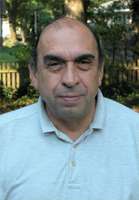Mario Acuña
Mario Acuña (March 12, 1940 – March 5, 2009), born in Córdoba, Argentina, was a research scientist at NASA Goddard Space Flight Center in the Space Plasmas and Planetary Magnetospheres Branches, and then as a Senior Astrophysicist. He was a major pioneer in the field of planetary magnetism.
Mario Humberto Acuña | |
|---|---|
 Photograph of Acuña taken in 2007. | |
| Born | March 12, 1940 Córdoba, Argentina |
| Died | March 5, 2009 (aged 68) Bowie, Maryland |
| Nationality | Argentinean |
| Citizenship | American |
| Alma mater | National University of Córdoba (B.A.) National University of Tucumán (MSEE) Catholic University of America (Ph.D) |
| Known for | Mars Global Surveyor Mission |
| Awards | Moe Schneebaum Memorial Award NASA Exceptional Scientific Achievement Medal NASA Distinguished Service Medal Presidential Rank Meritorious Award |
| Scientific career | |
| Fields | Planetary magnetism |
| Institutions | NASA Goddard Space Flight Center |
Biography
As a result of political unrest in Argentina, particularly in and around Universities, Dr. Acuña left Argentina and became a permanent resident of the United States of America.[1] He became a naturalized U.S. citizen in April 1994. He earned a B.A. degree in humanities and economics from the Universidad Nacional de Córdoba, an MSEE degree from the Universidad Nacional de Tucumán in 1967, and a Ph.D. in Space Physics from the Catholic University of America in 1974.[2]
Career
Positions held
Acuña was a principal investigator on magnetometer experiments flown on numerous missions over the years, from the Pioneer 11 Fluxgate Magnetometer Experiment in 1973 to the Mars Global Surveyor Magnetic Field Experiment in 1994,[3][4] and the MESSENGER magnetometer.
He was one of the leaders NASA delegation who visited Argentina in July 1987 to start the collaboration between NASA and CNIE (the predecessor of CONAE).[5][6]
Contributions
Dr. Acuña is best known for his work in Planetary magnetism and his contributions leading to the discovery of Jupiter's ring, as well as the magnetic field of Mars.[7] His research laboratory was involved in the Defense Meteorological Satellite Program in which they collected weather data for the military, as well as leading the world in development of scientific instruments that measure physical phenomena.[8]
Awards
Dr. Acuña has received many awards including the Moe Schneebaum Memorial Award in 1979,[9] the NASA Exceptional Scientific Achievement Medal in 1986, the NASA Distinguished Service Medal in 1996, the John C. Lindsay Memorial Award in 1999,[10] and the Presidential Rank Meritorious Award in 2003.
Death and Legacy
Dr. Acuña died March 5, 2009, aged 68, of Multiple Myeloma at his home in Bowie, Maryland. Dr. Acuña's blog is occasionally updated by his family members, and documents some of the personal experiences of dealing with his illness.
References
- NASA Scientist's Career Spans Agency History
- Dr. Mario Acuña Vitae
- Interview on The Space Show Modern
- Interview on The Space Show Archived
- Nora Bär (10 February 2017). "Satélites científicos: un programa que ya cumplió 30 años y se plantea más logros" (in Spanish). La Nación. Retrieved 5 June 2018.
Gran parte de la respuesta a este interrogante está cifrada en un nombre: Mario Acuña, un ingeniero cordobés que había emigrado a los Estados Unidos, donde desde 1969 trabajaba en el Centro Espacial Goddard. Él se convertiría en un pionero de la exploración espacial y daría el puntapié inicial para impulsar los esfuerzos locales.
- Horacio Ghielmetti (April–August 1987). "Los científicos de la NASA interesados en un proyecto argentino" (in Spanish). Astrofísica.
Estuvo además integrada por un grupo de científicos especialistas en tecnología espacial y física solar, pertenecientes a centros de la NASA y universidades americanas: Mario Acuña y Brian Dennis (Goddard Space Flight Center, NASA); Uri Feldman (Naval Research Laboratory); Gordon Hurford (Caltech); Robert Lin (University of California at Berkeley), y Hugh Hudson (University of California at San Diego)
- Obituary in the Washington Post
- Johns Hopkins Colloquium
- Schneebaum Award Recipients
- John C. Lindsay Memorial Award Recipient List
External links
- Super Mario's Blog
- National Society of Hispanic Physicists
- Mario Acuña at Lunar and Planetary Institute